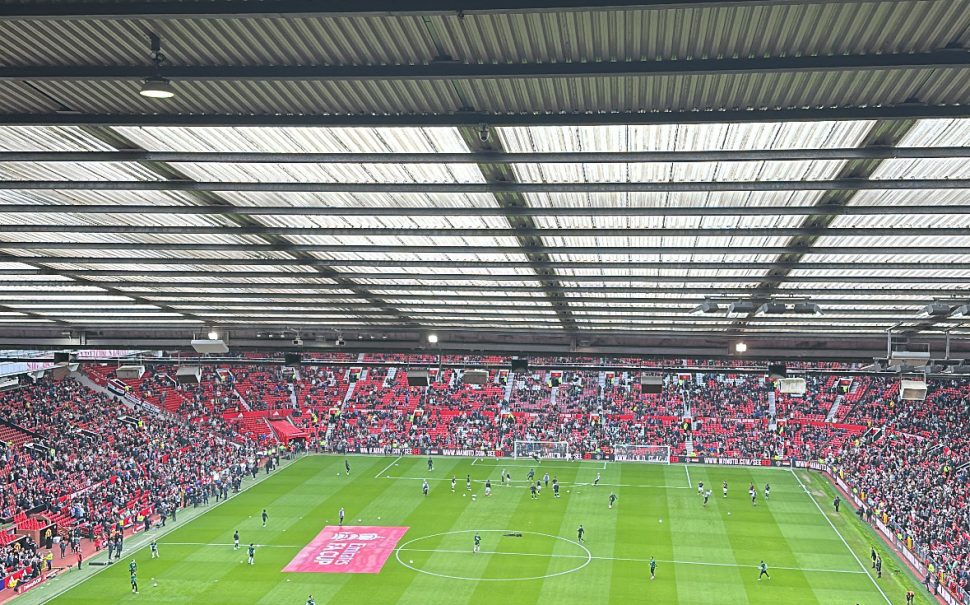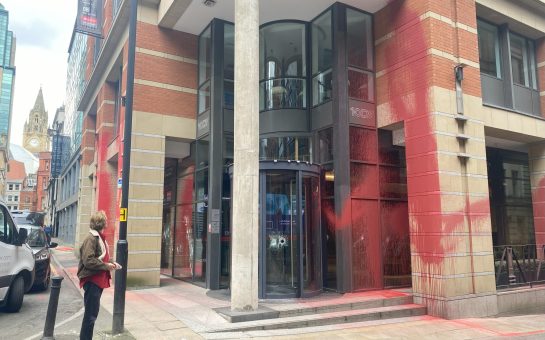Football fans of teams in the North West have been arrested nearly twice as much for ticket touting as those in London since 2014.
Home Office data shows a disparity between the two regions: in the nine years from the 2014/2015 season to the 2022/2023 season, 37 arrests were made in the North West for ticket touting offences while in London it was 19.
Some fans blame the smaller capacity of some North West stadiums for this difference, along with the demand for tickets from fans based all over the world for clubs like Liverpool – whose home ground Anfield expanded in capacity this season from 53,000 to 60,000, yet still sells out quickly.
Liverpool fan Olivia Edwards – who has bought touted tickets herself – said: “The demand for tickets is so much bigger than how many a stadium fits.
“Even with the expansion, tickets sell out within minutes.”
Across the North West a total of five teams had fans arrested for ticket touting offences across the nine-season period.
Liverpool fans had the most arrests with 17, followed by Manchester United in second with 12 and Manchester City in third with just five.
For all other North West clubs bar Everton and Bolton Wanderers, the figure was zero.
Both Liverpool and Manchester United have sold-out waiting lists for season tickets with some games requiring a ballot system to attend, meaning it’s not always easy for fans to attend a fixture through normal means – which may well be a reason for the relatively high numbers of touting-related arrests.
In London, however, there were just three teams who had fans arrested for the offence. Chelsea FC had the most with 10, double the amount of Tottenham Hotspur who had five arrests over the period, while Arsenal had four.
Lewis Thomas, 24, from Manchester, was sold a touted ticket for the derby between Manchester United and Manchester City at Old Trafford this season.
The price of the ticket was £52, yet he bought his for £150 – almost triple.
He said: “I really wanted to go to the match and see the derby.
“It is really unfair that I have to pay a huge amount but I would do anything for this club.”
Over time, the number of arrests made for ticket touting in the North West has fluctuated. The most arrests took place in the 2019/2020 season with 11, while the previous season had just one.
There were no arrests during the 2020/2021 season due to the Covid-19 pandemic, meaning that there were no fans at matches.
Another factor at play is the popularity of the teams on a global scale. Manchester United has an estimated 142 million fans across the world, while Chelsea and Liverpool have around 93 million.
The data only shows the number of reported arrests for touting – the likely amount of touting taking place is undoubtedly much higher.
Fans will not risk their one and only chance of getting a ticket to the game by reporting sellers.
Tackling the touts
As a result of touting, clubs are trying new ways to tackle the unauthorised resale of tickets..
Originally, fans would be sent paper tickets before the match. Then, football clubs moved to uploading tickets onto fan cards to reduce costs and for the environment.
Clubs such as Liverpool and Manchester City have now opted for e-tickets. Fans now have their season tickets and member cards downloaded onto their phone, which each game uploaded onto the pass.
You can only have one season ticket downloaded on a phone at one time. If you want the ticket to be downloaded on a different phone, you have to contact the club in order to do so.
If you are unable to attend the game, clubs give the option to sell the ticket back to the club or transfer the ticket to friends and family.
Clubs like Manchester United are trialling away e-tickets, which are non-transferable and one-off.
Having these tighter restrictions should in theory stop ticket touts from selling them on, but this is not the case. Touts are still able to transfer tickets at an inflated price to fans.
They also continue to sell tickets online for hugely inflated prices.
There are four acts that make ticket touting illegal:
- The Criminal Justice and Public Order Act 1994
- The Violent Crime Reduction Act 2006
- The Ticket Touting (Designation of Football Matches) Order 2007
- The Consumer Rights Act Amendment 2015
A tout’s perspective
With the maximum fine is £5,000 and a potential life banning order for anyone prosecuted for ticket touting, the deterrent is not strong enough – at least, according to one actual tout.
A ticket tout who wishes to remain anonymous told MM: “The amount of profit I make on selling tickets for more than face value will cover the fine.
“The life banning order hardly gets imposed on people and there are ways to avoid it.”
While touting is an offence that clubs want the police to take seriously, there are other crimes in the picture as well – which result in higher numbers of arrests.
Whilst Liverpool may lead the way for ticket touting offences, it is the Greater Manchester fans who have had the most arrests overall.
Out of the 2,574 arrests in the North West made between 2014-2023, the fans of Greater Manchester clubs contributed to 1,448 of these, which is 56.25%.
Fans of Manchester United were top with 428, with Manchester City second at 366.
Comparatively, Merseyside-based supporters of Everton and Liverpool were third and fourth highest on the list with 245 and 204 respectively.
The number of arrests has increased dramatically since the post-Covid return, with the 2022/2023 recording the highest number of footballing arrests in the nine-year period.
But out of the 10 most arrested fan bases in either the North West or London, seven support London teams. West Ham United fans were arrested the most – on 816 occasions in the nine year period. Though Manchester United had the most arrests in the North West, they sit sixth on the list.
The next four biggest offences for North West based fans are: violent disorder, public disorder, alcohol offences/driving under the influence of drink or drugs and possession of pyrotechnics.
Greater Manchester based fans lead the way in the highest number of arrests for these offences.
Featured image: Old Trafford, by Ambi Nahal




